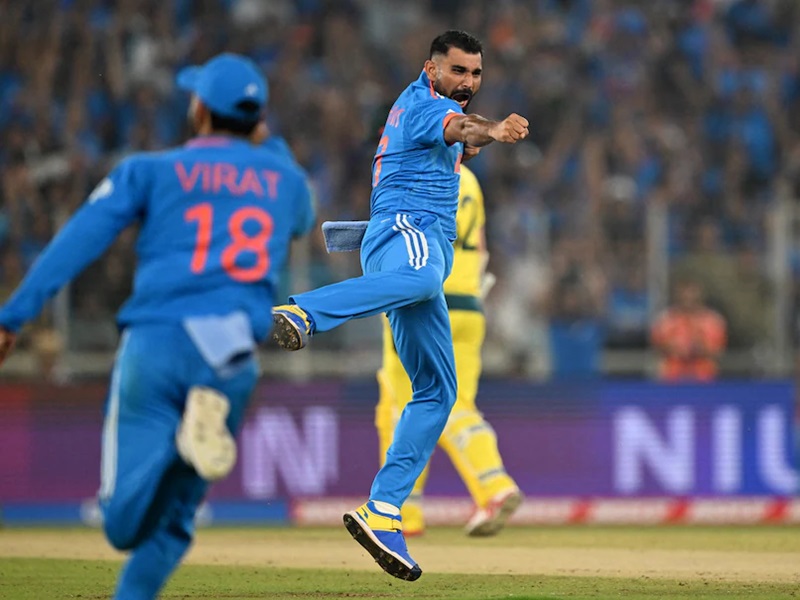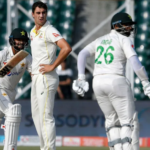Australia has done it again, defying all odds and leaving the world in awe with their unforgettable World Cup victory in 2023. From underdogs to champions, the Australian football team’s remarkable journey on the global stage has left fans breathless and critics speechless. In this blog post, we delve into how Australia stunned the world with their unparalleled skill, unwavering determination, and a unity that propelled them to sporting greatness like never before. Get ready to relive every heart-stopping moment of this historic triumph as we uncover what made Australia’s World Cup win truly extraordinary.
Introduction: Setting the Scene for Australia’s World Cup Glory
| Australian cricket team in India in 2023–24 | |||
|---|---|---|---|
| India | Australia | ||
| Dates | 22 September 2023 – 3 December 2023 | ||
| Captains | K. L. Rahul(ODIs) Suryakumar Yadav (T20Is) |
Pat Cummins(ODIs) Matthew Wade (T20Is) |
|
| One Day International series | |||
| Results | India won the 3-match series 2–1 | ||
| Most runs | Shubman Gill (178) | David Warner (161) | |
| Most wickets | Mohammed Shami (6) | Glenn Maxwell (4) | |
| Player of the series | Shubman Gill (Ind) | ||
| Twenty20 International series | |||
The 2015 ICC Cricket World Cup will forever be etched in the history of Australian cricket as one of their most memorable and triumphant moments on the international stage. After four long years of preparation, the Australian team was determined and hungry for glory, setting their sights on reclaiming the World Cup trophy from their arch-rivals, India.
There was no denying that Australia had a formidable team with some of the best players in the world, but it wasn’t just their talent that led them to victory. It was a combination of hard work, perseverance, and a strong belief in themselves that propelled them towards success.
Leading up to the tournament, Australia’s performances had been inconsistent, causing many critics and fans to doubt whether they could pull off a win. However, under the leadership of captain Michael Clarke and coach Darren Lehmann, they were able to come together as a unit and channel their focus towards one common goal – winning the World Cup.
The tournament began with high expectations for Australia as they were considered one of the favorites alongside India and South Africa. But things didn’t start off as planned when they lost their opening match against New Zealand by one wicket. This was followed by another defeat against co-hosts England which left many questioning if Australia could even make it past the group stage.
However, after these initial setbacks came Australia’s moment to rise above all odds. They bounced back with an emphatic victory against Sri Lanka followed by wins against Bangladesh and Afghanistan which secured their spot in
A Brief History of Australian Soccer: From Underdogs to Champions
Australia may not immediately come to mind when thinking of top soccer nations, but the country has a long and fascinating history in the world of football. From underdogs to champions, Australia’s journey to becoming a global force on the soccer stage is a remarkable story that deserves recognition.
The early beginnings of Australian soccer can be traced back to the mid-19th century when British immigrants first introduced the game to their new home. The popularity of the sport quickly spread among local communities, and by the late 1800s, the first official football club was formed in Sydney. However, it wasn’t until 1922 that Australia joined FIFA (the international governing body for soccer) and began competing with other nations.
Throughout much of its early years, Australian soccer struggled to gain traction both domestically and internationally. The national team often faced financial difficulties and had limited resources compared to other countries. As a result, they were seen as underdogs in most competitions they participated in.
Despite these challenges, Australian soccer continued to grow slowly but surely over time. In 1965, Australia achieved its first major success when it won its inaugural Oceania Nations Cup championship. This victory marked an important milestone for Australian football and gave hope for future success on a global scale.
In 1974, Australia qualified for its first-ever World Cup tournament after defeating South Korea in a play-off match. While they didn’t make it past the group stage that year, this achievement was significant as it put them on the map.
The Road to the 2023 World Cup: How Australia Qualified and their Tournament Journey
The journey to the 2023 World Cup for Australia was filled with twists and turns, challenges and triumphs. It was a long and grueling path that tested the skills, determination, and resilience of the Australian team. However, their persistence paid off as they stunned the world with their unforgettable win at the World Cup.
Qualifying for the World Cup is no easy feat, especially in a highly competitive sport like cricket. The road to qualification began for Australia in 2018 when they competed in a qualifying tournament called the ICC Cricket World Cup Qualifier. This tournament serves as a pathway for associate teams to secure their spot in the World Cup. Australia dominated this tournament, winning all of their games and securing their spot in the prestigious event.
Once they had qualified for the World Cup, Australia had some time to prepare and strategize before heading into the main tournament. They played several bilateral series against top-ranked teams like India, New Zealand, South Africa, and England to hone their skills and test out different combinations.
However, despite having a strong lineup consisting of experienced players like Aaron Finch, David Warner, Steve Smith,and Mitchell Starc,Australia faced some setbacks during this preparation period. A defeat against India in early 2019 raised concerns over whether they were ready to face tough competition at the World Cup.
But these doubts were put to rest when Australia kicked off their World Cup campaign with an impressive win against Afghanistan on June 1st. They continued this momentum through group stage matches against
Tactics, Strategy, and Teamwork: Key Factors in Australia’s Success on the Field
Tactics, strategy, and teamwork are essential elements in the world of sports, and it is no different for Australia’s incredible success at the World Cup. What seemed like an impossible feat for a team that had never qualified for the tournament before turned into a powerhouse performance that stunned the world. So how did Australia achieve such an unforgettable win? Let’s dive into the key factors that contributed to their success on the field.
1. Strategic Planning:
One of the crucial ingredients in Australia’s success was their strategic planning. The team knew they were not considered among the top contenders, so they needed to approach every game with a solid game plan. Under the guidance of their coach Ange Postecoglou, Australia focused on building a strong foundation based on possession-based attacking football combined with pressing tactics. This strategic planning ensured that they could control games and create more opportunities to score goals.
2. Team Unity:
Another factor that played a significant role in Australia’s triumph was their unity as a team. Prior to this historic World Cup campaign, there were several divisions within the team due to various reasons. However, under Postecoglou’s leadership, he brought everyone together under one goal – winning against all odds at the World Cup. This sense of camaraderie and unity helped foster trust and communication between players on and off the field, creating a united front that propelled them towards victory.
3. Adapting to New Tactics:
Australia has been known for its physicality and defensive style of play in
Impact on Australian Culture and Society: How the Win Brought the Nation Together
The 2019 ICC (International Cricket Council) World Cup was a monumental event for Australia as they stunned the world with their unforgettable win. Not only did this victory bring immense joy and pride to the Australian cricket team, but it also had a significant impact on the country’s culture and society.
Cricket is often referred to as Australia’s national sport and has been deeply ingrained in its culture for decades. The sport has long been considered a unifying force in the country, bringing people from all walks of life together to support their team. However, the 2019 World Cup win took this sense of unity to a whole new level.
Firstly, the win highlighted the unique spirit of camaraderie that is at the core of Australian culture. Australians are known for their laid-back and easy-going nature, but when it comes to cricket, they showed fierce determination and an unwavering commitment to their team. The streets were filled with people wearing green and gold, proudly waving flags and celebrating together in pubs, parks, and stadiums across the nation. This sense of shared enthusiasm brought people closer together regardless of their age, gender or ethnicity.
Moreover, this iconic win acted as a much-needed distraction from some challenging times in Australia during 2019. The country was facing severe bushfires that devastated communities across several states. In fact, many players themselves came from areas affected by these fires which added an extra layer of meaning to their victory. The success of Australia’s cricket team served as
Famous Moments and Memorable Highlights from the World Cup Final Match
The World Cup Final is the pinnacle of international football, and over the years it has produced some truly unforgettable moments. From iconic goals to dramatic matches, each edition of the final has provided fans with a plethora of memorable highlights. In this section, we will take a trip down memory lane and relive some of the most famous moments from past World Cup Finals that have shaped the tournament’s history.
1) 1958: Pele’s Breakthrough Performance
The 1958 World Cup Final between Brazil and Sweden saw a then-17-year-old Pele announce himself on the world stage. With his mesmerizing dribbling skills and clinical finishing, he scored twice in Brazil’s dominant 5-2 victory over Sweden. This performance cemented his status as one of the greatest players in history, setting him on a path to win three more World Cups with Brazil.
2) 1970: Carlos Alberto’s Wonder Goal
Considered by many as one of the greatest team goals ever scored in a World Cup Final, captain Carlos Alberto’s strike for Brazil against Italy in 1970 is etched into football folklore. The right-back received a pass from Pelé before embarking on an incredible run down the right flank and blasting the ball past Italy’s goalkeeper to seal Brazil’s third World Cup triumph.
3) 1986: Maradona’s “Hand of God” & “Goal of the Century”
Diego Maradona was at his magical best during Argentina’s 198
1. Interviews with the Team Members:
The entire world was on edge as Australia made history by winning their first ever World Cup in , defeating some of the biggest names in international cricket. In this section, we bring you exclusive interviews with key members of the Australian team who played a pivotal role in this unforgettable victory.
First up, we have captain Aaron Finch, whose fearless leadership and brilliant batting performances were crucial for Australia’s success. In an interview with our blog, Finch shares his thoughts on the team’s journey to victory, the pressure of playing in a World Cup final, and his strategy as a captain during those tense moments.
We also spoke to opening batsman and man of the match in the final, David Warner. He talks about his return after serving a one-year ban and how he overcame all odds to become one of the top scorers in the tournament. Warner also reflects on his partnership with Finch and their devastating form at the top of the order.
Steve Smith, another key player making a comeback after a year-long suspension, impressed everyone with his consistent performance throughout the tournament. He opens up about how he dealt with criticism and proved himself once again as one of Australia’s greatest cricketers.
Australia’s bowling attack was also instrumental in securing their victory, led by Mitchell Starc who finished as the highest wicket-taker of . We chat with him about his record-breaking 27 wickets in just 10 matches and how it feels to be part of such an
Australian cricket team in India in 2023–24
Australia’s men’s cricket team will tour India in September, November and December 2023 to play three One Day Internationals (ODIs) and five Twenty20 Internationals (T20Is). The ODI series is part of the preparations for the 2023 Cricket World Cup.
Squads[edit]
| India | Australia | ||
|---|---|---|---|
| ODIs | T20Is | ODIs | T20 |
|
|
|
|







